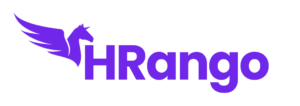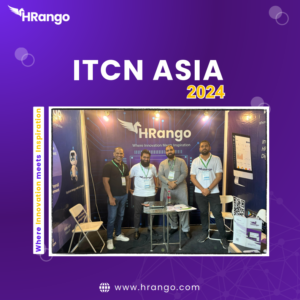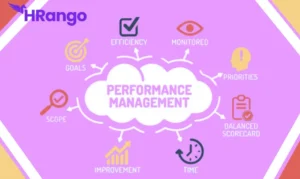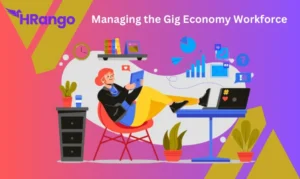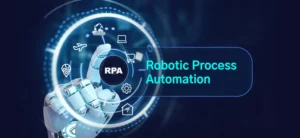As the future of work continues to evolve, Human Resource Management Systems (HRMS) are becoming central to the transformation of workplace dynamics. These systems are not merely tools for administrative tasks but are now driving strategic initiatives that shape how organizations function. Platforms like hRango are at the forefront of this evolution, integrating advanced technologies to meet the demands of modern workplaces.
Key Trends in HRMS Adoption
- AI and Automation: The integration of Artificial Intelligence (AI) and automation in HRMS is revolutionizing traditional HR processes. AI-powered features in HRango, for instance, enable predictive analytics, automate routine tasks such as payroll and leave management, and enhance recruitment processes by filtering candidates based on predefined criteria. This automation allows HR teams to focus on strategic initiatives rather than getting bogged down by administrative work.
- Enhanced Employee Experience: The modern workforce places a high value on employee experience. HRMS platforms like HRango are designed with this in mind, offering personalized dashboards, self-service options, and mobile access. These features empower employees to manage their HR-related tasks independently, from accessing pay slips to requesting time off, which leads to increased satisfaction and engagement.
- Data-Driven Decision Making: Data is the new currency in HR management. HRMS platforms are leveraging big data to provide actionable insights that drive decision-making. HRango, for example, utilizes data analytics to monitor employee performance, track attendance, and measure the effectiveness of training programs. These insights help HR leaders make informed decisions that align with organizational goals.
- Integration and Scalability: As organizations grow, so do their HR needs. HRMS platforms like HRango are built to integrate seamlessly with other enterprise systems, such as CRM and ERP platforms, ensuring that all business processes are interconnected. Additionally, these systems are scalable, allowing businesses to add new functionalities as they expand, without disrupting existing workflows.
- Remote Work Management: The shift towards remote and hybrid work models has accelerated the need for HRMS platforms that can manage a distributed workforce. hRango’s remote work modules are designed to support communication, collaboration, and performance tracking across geographically dispersed teams. This ensures that employees remain productive and engaged, regardless of where they are located.
Innovations Shaping the Future of HRMS
- Predictive Analytics: Predictive analytics is a game-changer in HR management. By analyzing historical data, HRMS platforms can forecast future trends, such as employee turnover, recruitment needs, and training requirements. HRango’s predictive analytics tools enable HR teams to be proactive rather than reactive, helping them to anticipate challenges and take preemptive actions.
- Blockchain Technology: The integration of blockchain technology into HRMS platforms is enhancing data security and process transparency. In hRango, blockchain is used to securely manage employee records, contracts, and payroll, ensuring that sensitive information is tamper-proof and transactions are transparent. This innovation is particularly important in an era where data breaches are becoming increasingly common.
- Advanced Learning and Development: Continuous learning is critical for both employee growth and organizational success. HRMS platforms are evolving to include sophisticated Learning Management Systems (LMS) that offer personalized learning paths, track progress, and provide insights into the effectiveness of training programs. HRango’s LMS is designed to meet the diverse learning needs of today’s workforce, ensuring that employees have the skills required to thrive in their roles.
Conclusion
The role of HRMS in shaping the future of work cannot be overstated. These systems are no longer just tools for managing HR tasks; they are integral to driving business strategy and ensuring organizational agility. As platforms like HRango continue to innovate, they will be crucial in helping organizations navigate the complexities of the modern workplace, from managing remote teams to enhancing employee engagement and leveraging data for strategic decision-making.
FAQs
What is HRMS?
HRMS, or Human Resource Management System, is software that automates and streamlines HR functions such as payroll, recruitment, performance management, and employee engagement.
How does HRango utilize AI in HR management?
HRango uses AI to automate routine tasks, provide predictive analytics, and enhance recruitment processes, allowing HR teams to focus on strategic initiatives.
Can HRMS platforms like HRango support remote work?
Yes, HRango offers remote work management tools that facilitate communication, performance tracking, and collaboration among remote teams, ensuring productivity regardless of location.
What is the role of predictive analytics in HRMS?
Predictive analytics helps organizations forecast workforce trends, such as employee turnover and training needs, enabling proactive HR management.
How does HRango ensure data security in HR processes?
HRango integrates blockchain technology to secure sensitive employee data and streamline processes like payroll and contract management, ensuring transparency and security.
